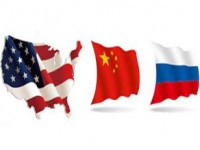Chen Xiangyang, Director and Research Professor, CICIR
Jul 03, 2015
The media and public opinion have become the new focuses of major-power competition, as the US struggles to maintain a supreme position in the current world order.
Richard Weitz, Senior Fellow, Hudson Institute
Jun 26, 2015
As permanent members of the UN Security Council, Chinese and U.S. leaders should look beyond the recent deadlocked Nuclear Non-Proliferation Treaty and use their next U.S.-China Strategic and Economic Dialogue to make further progress in promoting nuclear disarmament, nuclear non-proliferation, and supporting the safe and secure peaceful use of nuclear energy.

Jun 18, 2015
"Issue-specific partnership, instead of alliance" may become an outstanding feature of the three countries relations in the future, but their varying relationships challenge their ability to work together to meet global problems and coordinate global governance.
Yin Chengde, Research Fellow, China Foundation for International Studies
Apr 17, 2015
Though it would be an exaggeration to say another Cold War is occurring between the U.S. and Russia, their relationship has indeed descended to a new low because of the worsening situation in Ukraine. Yin Chengde posits that the locus of tension is in each sides’ challenge for influence in Ukraine, while China believes it should be solved through political and diplomatic means.
Yu Sui, Professor, China Center for Contemporary World Studies
Apr 02, 2015
A conflict of sovereignty and identity in Ukraine has drawn speculation as to China’s role in mediation. Despite the ongoing dilemma, China has remained impartial in the matter, repeatedly appealing to all relevant parties to respect International Law as well as the basic norms governing international relations; Ukraine and Russia must settle the dispute through dialogue to maintain peace in the region.
Mar 20, 2015
Last Friday, the United States released its updated Cooperative Strategy for 21st Century Seapower (CS-21). One of the biggest critiques of the first Cooperativ
Yu Sui, Professor, China Center for Contemporary World Studies
Feb 24, 2015
Not only do conflicts between U.S., China and Russia affect the world, their interdependence and occasional synergy also shapes world affairs. The U.S. and Russia still have an unstable relationship and could learn confidence building from the China-U.S. or China-Russia relationships.
Ted Galen Carpenter, Senior Fellow, Randolph Bourne Institute
Jan 30, 2015
America’s long-standing affront with North Korea needs fresh approaches, especially considering its increasingly disruptive international actions. Ted Carpenter proposes that instead of trying to increase unilateral sanctions on Pyongyang, Washington should make a concerted effort to reduce tensions with Kim Jong-un’s regime by creating a united front with China and Russia.

Zheng Yu, Professor, Chinese Academy of Social Sciences
Dec 11, 2014
Intensification of Russia-U.S. tensions since 2003 has an objective impact on America’s strategic shift east and delays the beginning of a comprehensive strategic game between China and U.S. over economic and political competition in the Pacific.
Yu Sui, Professor, China Center for Contemporary World Studies
Nov 21, 2014
Yu Sui discusses China-Russia power relations built on “the five principles of peaceful coexistence,” which has yielded beneficial economic, security, and diplomatic cooperation between the two nations. Also discussed is the differentiation between Russia and China’s Central Asian ambitions through the respective Eurasian Alliance and Shanghai Cooperation Organization.